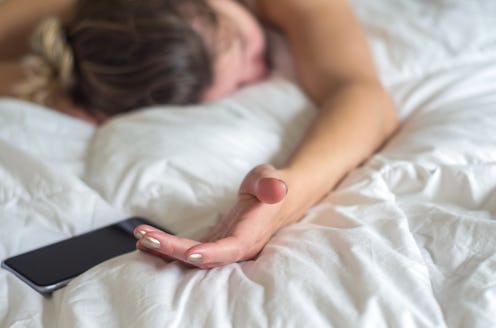Life
7 Little Habits You Didn't Realize Can Sabotage Your Sleep
If you're having trouble falling asleep or sleeping soundly throughout the night, it may be due to certain before-bed habits that could be messing with your rest. Unfortunately, certain causes of sleep deprivation could leave you feeling weary and low in energy come morning. And, it's really a matter of what you're doing during the daytime that can carry over into night. Good news: with a few tweaks, it's easy to get that rest your body needs.
As a certified health coach, I work with clients on falling asleep naturally, in order to repair muscles and restore body tissues that have been lost from the day's activities. However, if you're missing those valuable minutes of snoozing, it can certainly negatively affect your health, wellbeing, and productivity at work the following the day. And, if it becomes a pattern it can lead to trouble focusing, difficulties remembering things, and a weakened immune system. The long-term side effects of sleep deprivation may even extend to your brain and your gut. Of course finding ways to naturally induce sleepiness is helpful, but it's also a matter of what you're doing in the hours earlier that might be preventing you from powering down at night. Here are seven little habits that could be compromising your sleep, according to experts.
1Sleeping In On Weekends
Having a set sleep schedule is super important, so if you're sleeping in on the weekends, it might make you less able to fall asleep at a normal hour during the week. Sleep expert Dr. Lee Chiong tells Bustle that when you sleep longer than normal, you disturb your normal circadian rhythm, which can leave you feeling groggy. It's OK to sleep an extra hour or so, but don't let it go longer than that.
2Eating Dinner Too Late
If you're eating a huge, heavy meal too close to bedtime, it could make it more difficult to stay asleep. Going to bed full without having enough time to digest can lead to discomfort and stomach problems, which can keep you awake. A 2005 study by The American Journal of Gastroenterology found that eating dinner within 3 hours of going to bed resulted in symptoms of acid reflux. Instead, eat a smaller meal or snack when it gets too late.
3Using Technology Too Late
Try not to be scrolling through your phone too close to bed. "Using a smartphone, computer or tablet after 9 p.m. can mess with your sleep schedule," Dr. Robert Glatter, MD, an assistant professor of emergency medicine at Northwell Health and attending emergency physician at Lenox Hill Hospital, tells Bustle. "Engaging in stressful activities related to work such as checking email can elevate stress levels, and reduce your ability to sleep soundly. In addition, the light from your phone or tablet may reduce the production of melatonin, a key hormone that's integral in promoting sleep," Glatter says.
4Drinking Excess Caffeine
Steer clear of that espresso before bed. "Avoid caffeine, alcohol, and drinking excess water too close to bedtime," says Glatter. "These may all reduce your quality of 'good' sleep." And, if you're prone to a caffeine sensitivity in particular, you may want to cut off sooner. Maybe even in the afternoon.
5Taking Certain Medications
Certain medications could be affecting your quality of sleep, too. "Taking allergy medicine that contains pseudoephedrine at bedtime can prevent you from sleeping," says Glatter. "It may elevate your blood pressure, and prevent you from entering the normal phases of sleep efficiently." Before taking anything, always speak to a doctor first, especially if it's impacting your sleep.
6Long Streaming Sessions
"[Spending hours streaming] shows during the week can mess with your sleep," says Glatter. When you're too stimulated from media, it's hard to power down. And, you'll likely want to keep watching. "If possible try to reserve this for weekends," says Glatter and stick to one or two shows in the week a night.
7Not Getting Into Bed Soon Enough
Glatter terms this as "engaging in 'sleep procrastination,'" where you're waiting too long to hit the hay. A fix? "Set a clear time for sleep," says Glatter. "Don’t let emails, texts, and other web related activities disrupt your sleep plans. Sleep is the way your brain recharges itself." So give yourself some time to wind down before bed. Your body will thank you for it.
If you find you're losing your precious hours of sleep, you'll want to make some changes to your routine, even starting hours ahead of when you'll actually get underneath those sheets. When you're more awake and focused, you'll be happy you did.
